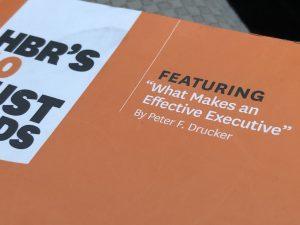Peter Drucker was one of the most influential thinkers on management of the last century. He was born in 1909 and died in 2005 so his life spanned a century during which he wrote 39 books and countless articles. While I had heard his name before, he came to my attention recently when I was preparing a reflection about what we each are building with our lives here. He had made a story famous which I used and so it sparked an interest to learn more about him as well.
So when I came across a piece by him in a compilation book of articles called “On Leadership” by the Harvard Business Review, I was curious to see what he had to say on the topic of what makes an effective executive. Essentially his argument is that to be an effective leader it is not so much about charisma or whether a person is introverted or extroverted. Instead he boils it down to eight essential questions or patterns of behaviour which really set them apart. Some of the key ones were:
- Thinking and saying “we” rather than “I” – authority comes from gaining others trust so consider what the organisation needs not what you need;
- Developing of action plans – specify what the results are that you want and understand where the constraints are to achieving them. Include check in times and also the ability to pivot to seize new opportunities;
- Taking responsibility for decisions and communicating those – accountability is important so be clear about who makes decisions and regularly review processes;
- Focussing on opportunities, not problems – putting out fires and solving problems is short term and to grow an organisation needs to seek out new opportunities. Match your best people with the best opportunities; and
- Running productive meetings – be clear about the reason for meeting and finish them once that objective is achieved. “Good executives don’t raise another matter for discussion”. Then follow up to summarise the meeting and agreed next steps.
The short article was consistent with other things I have read by and about Peter Drucker as they always emphasise having a strategic approach focussed on the long term. For me the key takeaway was the first point mentioned about the words we use. It is tempting in our individualistic culture to talk about ourselves and “I” more than emphasising team and “we”. But the language that we use is a model for how we actually perceive things and so it is important to be conscious and deliberate in how we choose our words.




